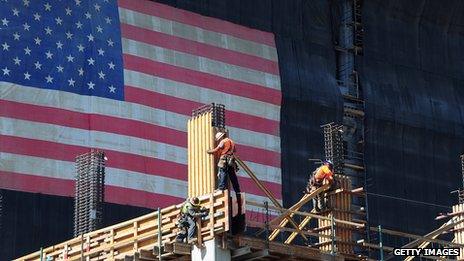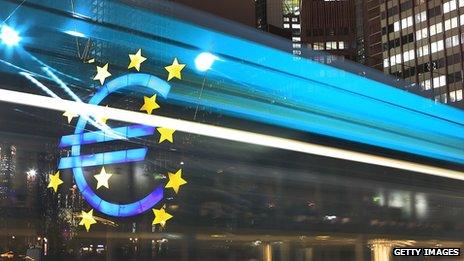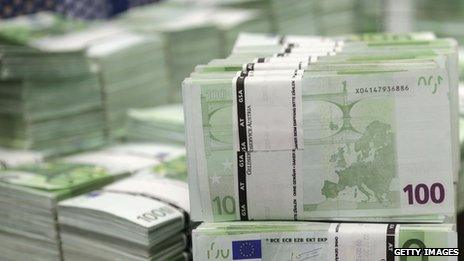Goldman Sachs warns on Britain and the EU
- Published
- comments
Gary Cohn: "Having the UK be part Europe is the best thing for all of us"
Gary Cohn, the President of Goldman Sachs, has said publicly what many financial chief executives are thinking privately.
Why risk pulling out of the European Union given that one of Britain's few business sectors with a healthy trade surplus is financial services?
Of course, not all agree that the City's position would be adversely affected by not being in the EU.
In fact, without the need to follow all the EU regulations, Britain might become a more attractive place to do financial business. Look at Singapore, it is argued.
Mr Cohn is not so sure. If Britain isn't in the EU, what restrictions will be put in place for banks headquartered in London that need to do business in Europe?
Consequences
They are called "passporting" rules.
And they could be onerous.
"I think that having a great financial capital of the world staying in the UK - and having the UK be part of Europe is the best thing for all of us," Mr Cohn told me at the World Economic Forum in Davos.
He went on to emphasise the value of London to the UK economy.
"I think it is hard to understand all the effects that the financial services sector has in the UK," he said.
"We are a huge employer both directly and indirectly, a huge economic engine for the UK.
"Think of all the people we employ - think of all the taxis, the restaurants, the accountants, the law firms - the people that we attract. I think it's got a major impact on London and the UK.
"I don't know what would replace that industry in the UK."

Global outlook
Turning to wider global themes, Mr Cohn's view can be summed up under three neat headlines:
US going well (the oil price decline has given the American economy a $3bn boost) but there is no need for the Federal Reserve to raise rates until next year.
The eurozone is a lot better than it was.
We should all worry about central banks engaging in "competitive devaluations", a sort of currency war by proxy.
On America, Mr Cohn says that although the Fed might be keen to raise interest rates, they should be cautious.
"If you look at the employment situation in the United States at the moment and you look at the inflation situation, or lack of it, we are not near target inflation rate yet," he said.
"Until we see real inflation and real employment growth I don't think they will raise rates.
"If we raise rates and the dollar strengthens, that will slow down the US economy.
"Central bankers never want to be in a position to turn the economy into negative territory. I think it is going to be very difficult for the Fed to raise rates - I'm 2016 and beyond [when they will do it]."

Eurozone optimism
Despite fears over political risk, Mr Cohn believes that the eurozone is looking more positive. The fact that the European Central Bank has finally announced its plans for up to 1 trillion euros of monetary easing by September 2016 has helped.
"I think 2015 looks pretty good for the eurozone," he said.
"I know there are elections and I know that some people think these are referendums on the eurozone.
"It seems to me that the way things are today, the eurozone is going to stay together. But it does feel like there will be a lot of noise in the system for the next few years."
That noise will only increase with the Greek elections on Sunday.
And harder, structural reform is still necessary.
"Monetary policy can only go so far - we've got negative interest rates in parts of Europe already, you've got a devaluing currency - that will all be helpful.
"But they can't do the entire job themselves and we need to get people back to work.
"We've got to get people consuming, we've got to get people spending money. Those things will do a lot more than making money more readily available."

Currency war?
Of course, the ECB announcement has led to a significant decline in the value of the euro.
Japan's decision on monetary easing had a similar affect on the yen. For some, it is evidence of a currency war.
"We have been living in a world where many countries have been trying to devalue their currencies to grow their economies," Mr Cohn said.
"You devalue your currency, you obviously make yourself more competitive - some people believe you are exporting your deflation.
"When you do this you are exporting your deflation. So you are creating an unfavourable situation for the country whose currency is rallying.
"Right now China, the US and Switzerland - their currencies are rallying.
"Those places become less and less competitive and places like the eurozone become more competitive.
"US exports become more expensive. It turns into a bit of a war because everyone is trying to do the same thing."